Key takeaways:
- Self-care in ministry is essential for emotional and spiritual health, emphasizing the need to recognize personal boundaries and avoid burnout.
- Regular practices like prayer, meditation, physical activity, and social interactions with supportive peers are vital for maintaining well-being.
- Engaging in hobbies and establishing a consistent self-care routine helps recharge and reconnect with one’s inner self.
- Community involvement and sharing experiences with others enhance resilience and foster a sense of shared humanity.
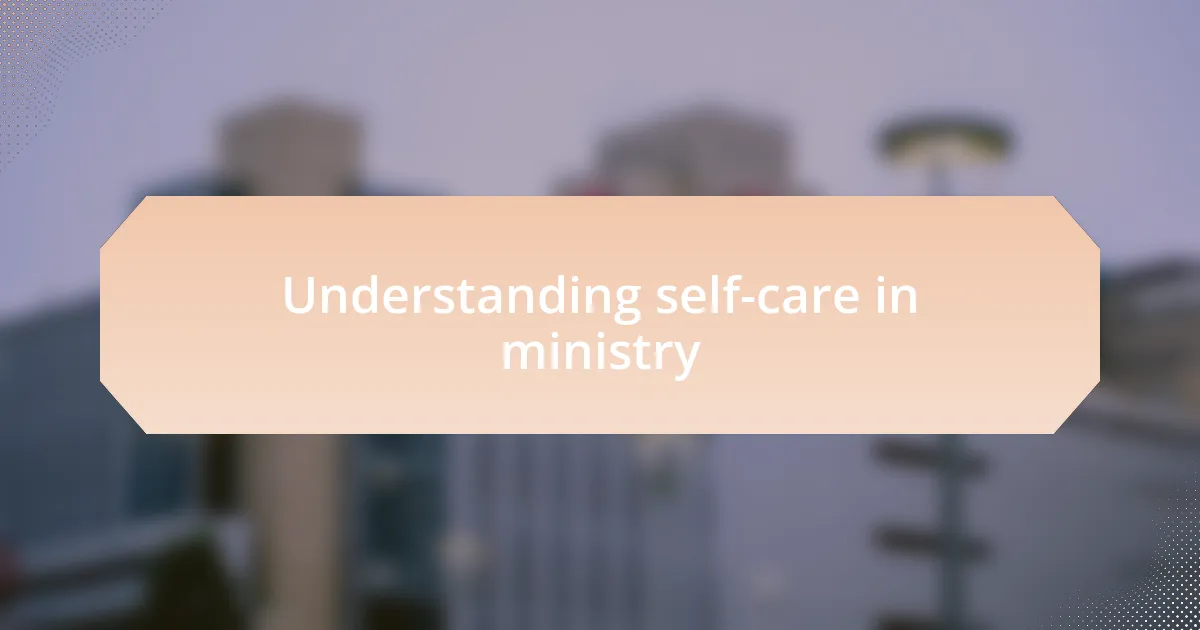
Understanding self-care in ministry
Self-care in ministry is often misunderstood. It’s not about being selfish; it’s about recognizing our humanity. I recall a time when I got so caught up in serving others that I neglected my emotional needs. After a particularly demanding week, I realized that I could not pour from an empty cup. This experience taught me the profound importance of self-care in my role.
Another aspect of self-care is its impact on spiritual health. I’ve often found that my connection with God deepens when I take the time to reflect and recharge. For instance, incorporating moments of solitude into my day has been transformative. Instead of rushing from one task to the next, I pause to pray or meditate. How often do we allow ourselves to simply be still and listen for guidance in the chaos of ministry life?
Moreover, it’s vital to establish boundaries. When I first started, I found it hard to say no despite feeling overwhelmed. It dawned on me that saying no sometimes is not a failure; rather, it’s a necessary step toward preserving my well-being. By honoring my limits, I’ve been able to serve more effectively and authentically. How do you recognize your boundaries, and are there practices you can adopt to maintain them?
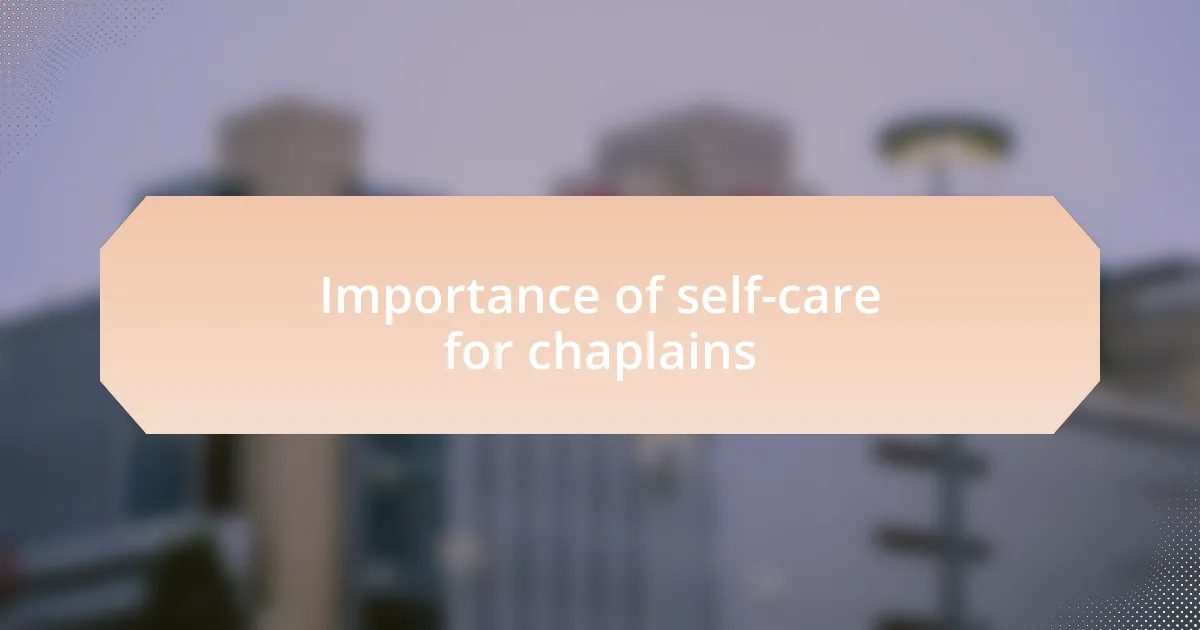
Importance of self-care for chaplains
Self-care is crucial for chaplains because our roles demand a deep emotional investment. There have been moments when I’ve felt the weight of countless burdens from those I serve. In those times, a simple walk in nature or a heartfelt conversation with a friend reminded me that I’m not alone in this journey, which helped lift the emotional heaviness.
Prioritizing self-care doesn’t just benefit us; it enhances our ability to be present with others. I remember a particularly draining week where I neglected my own needs. When I finally scheduled time for reflection, I noticed how much more compassion I could offer. This revelation made it clear to me that replenishing our minds and spirits is essential to truly support those around us. How can you ensure that you’re giving yourself the necessary care to be there for others?
Ultimately, self-care sets the tone for our ministry. When I engage in activities that recharge me—like journaling or attending quiet retreats—I find I can connect more deeply with those seeking comfort. These practices help cultivate a nurturing environment where both the chaplain and the congregant can heal. In what ways do you celebrate your own well-being, and how does it influence your ministry?
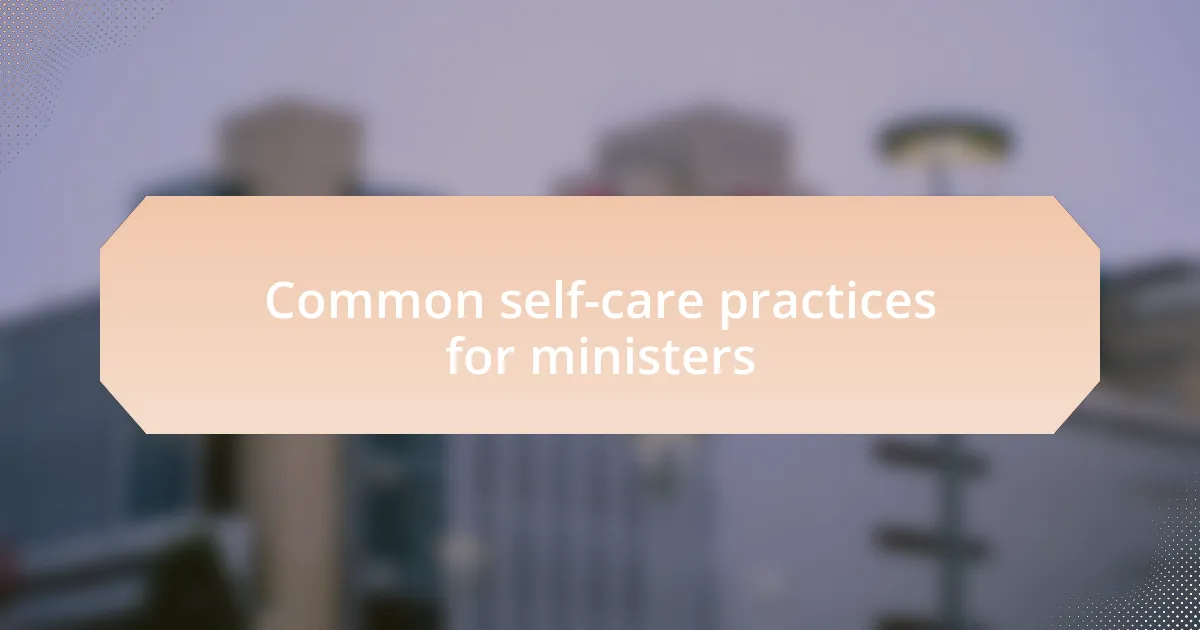
Common self-care practices for ministers
When it comes to self-care practices for ministers, I’ve found that setting aside time for daily prayer and meditation is invaluable. Each morning, I dedicate a few minutes to sit quietly, allowing myself to connect spiritually and calm my racing thoughts. This simple yet profound act centers me, preparing me for the challenges of the day ahead. Have you ever noticed how grounding moments can shift your perspective entirely?
Engaging in regular physical activity is another essential practice. For me, nothing beats the invigorating feeling I get from a morning jog or an evening yoga session. I remember a particularly stressful season where I became sedentary, and it took a toll on my energy and mood. Once I integrated movement into my routine, I felt a renewed sense of vitality and clarity that greatly enhanced my interactions with those I serve. What physical activities rejuvenate your spirit?
Lastly, I’ve discovered the importance of forming a strong support network. Whether it’s hanging out with fellow chaplains over coffee or seeking counsel from a mentor, surrounding myself with understanding individuals makes a world of difference. During one tough period, sharing my challenges with trusted friends provided not just comfort, but practical advice that I hadn’t considered. How do you cultivate your own community of support in times of need?
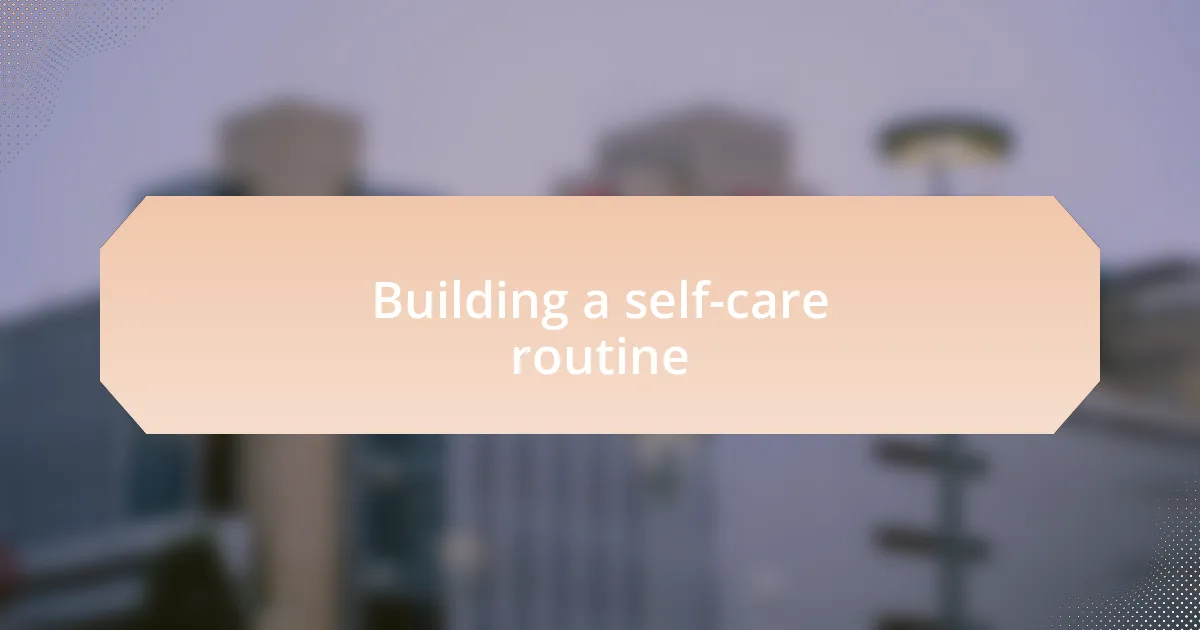
Building a self-care routine
When I began crafting my self-care routine, I realized that consistency was key. I set specific times for activities that nourished my spirit and body, such as journaling every evening. There’s something cathartic about putting my thoughts on paper after a long day; it allows me to process emotions and gain clarity. Have you considered establishing a predictable rhythm to your self-care practices?
Another vital aspect I’ve incorporated is dedicated time for hobbies that bring me joy. For instance, I love painting. Every weekend, I allow myself to indulge in a few hours of artistic expression, completely immersing myself in colors and textures. This creative outlet not only fosters relaxation but also reconnects me with the parts of myself that can sometimes get overshadowed by the demands of ministry. What hobbies make you lose track of time?
Lastly, I’ve learned to listen to my own needs, which isn’t always easy. During hectic weeks, there’s a temptation to skip my downtime. Yet, I remember a week where I ignored my need for rest and ended up feeling overwhelmed and irritable. Recognizing these signals is crucial; I now prioritize rest, treating it with the same urgency I would a work commitment. How do you tune into your body’s signals for self-care?
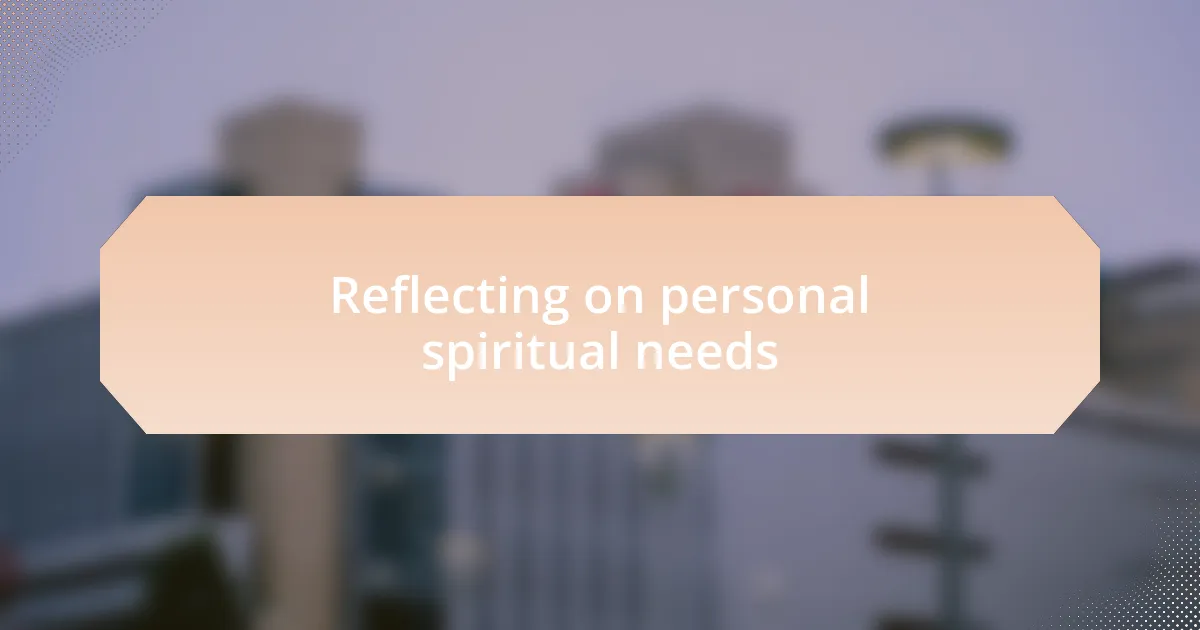
Reflecting on personal spiritual needs
Reflecting on my personal spiritual needs has been a transformative journey. I often take quiet moments to sit in stillness and assess my inner landscape. Once, after a particularly challenging week, I found myself feeling spiritually drained despite being surrounded by the sacred. It was a wake-up call: I needed to carve out specific times for prayer and meditation to replenish my spirit. How often do we ignore the whispers of our souls?
In this reflective practice, I’ve uncovered layers of my spirituality that I had previously overlooked. I remember a day when I decided to spend time in nature, allowing the serenity of my surroundings to speak to my heart. That day, watching the sunlight filter through the trees, I realized how much I craved connection—not just with the world around me, but with my own spirit. How do the environments you surround yourself with impact your inner peace?
Acknowledging my spiritual needs has also led me to explore new rituals. I’ve started lighting a candle each morning during my quiet time, signaling to myself that it’s a moment dedicated solely to nurturing my soul. This simple act has created space for gratitude and introspection. It reminds me that attending to my spiritual health is as crucial as any other aspect of self-care. Have you found small rituals that resonate deeply with your spirit?
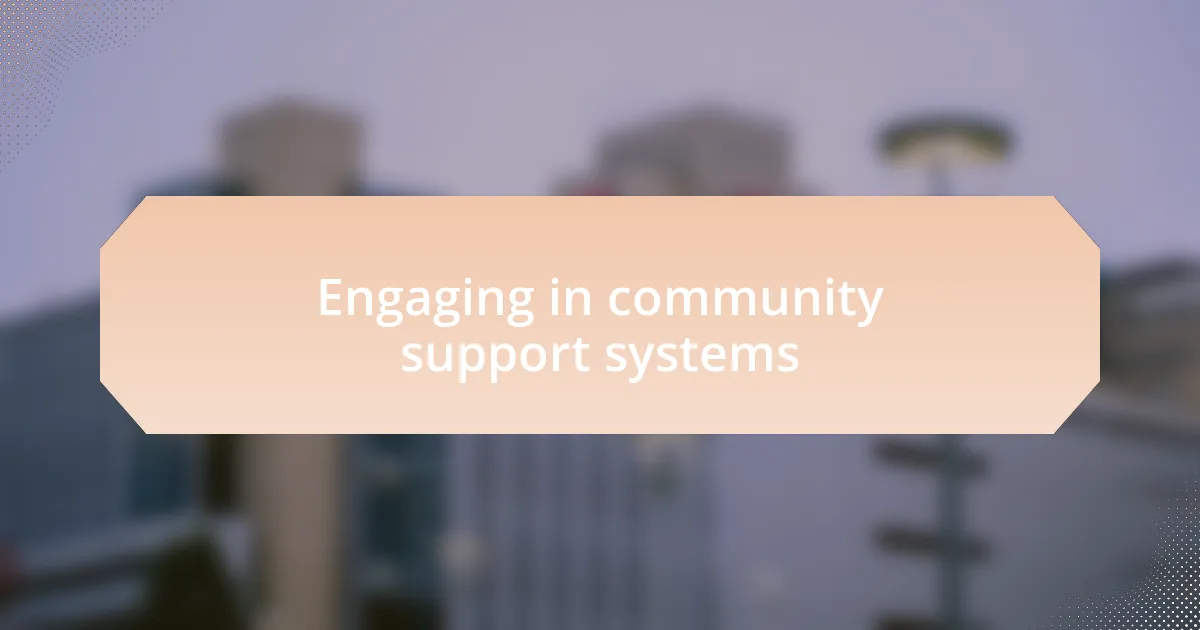
Engaging in community support systems
Engaging with community support systems has profoundly enriched my role as a chaplain. I recall joining a local caregiver support group where members shared their joys and challenges. Listening to their stories illuminated the power of collective resilience. How often do we underestimate the healing that comes from simply being present with others?
Participating in community events, like health fairs or memorial services, has also been deeply impactful for me. At one event, I offered a small workshop on grief, which opened up heartfelt conversations among attendees. Witnessing connections spark among individuals facing similar struggles made me realize that vulnerability truly fosters community. Have you ever considered how sharing our burdens can lighten their weight?
Moreover, I’ve volunteered at shelters, where I not only provide spiritual care, but also witness the strength within vulnerable populations. One evening, I spoke with a woman who had recently lost her home. As we shared stories over a warm meal, I felt the sacred bond that formed in that moment. Engaging with others in this way reminds me that support systems are not just about giving; they are about receiving the abundance of shared humanity. Who in your community could benefit from a listening ear?